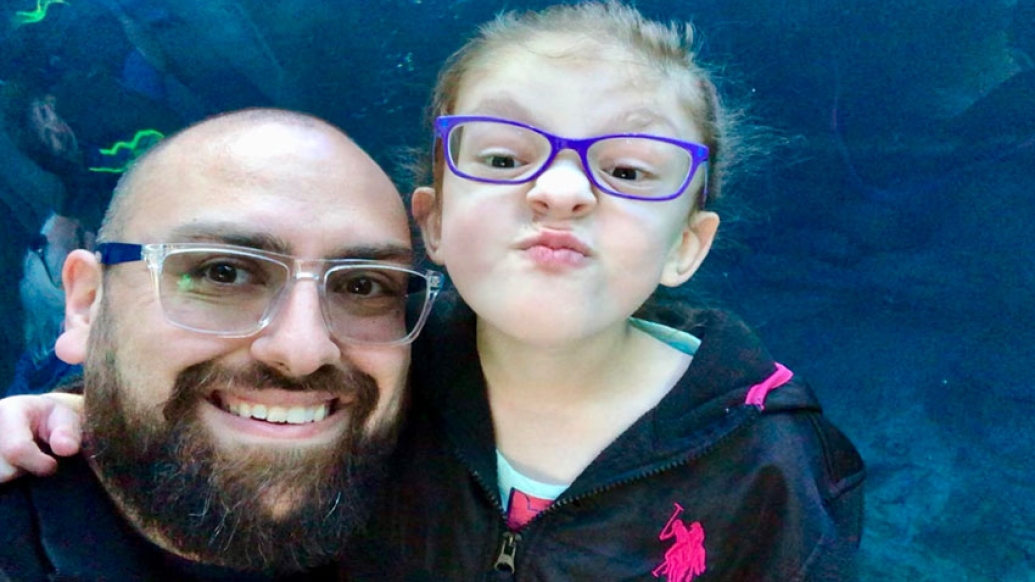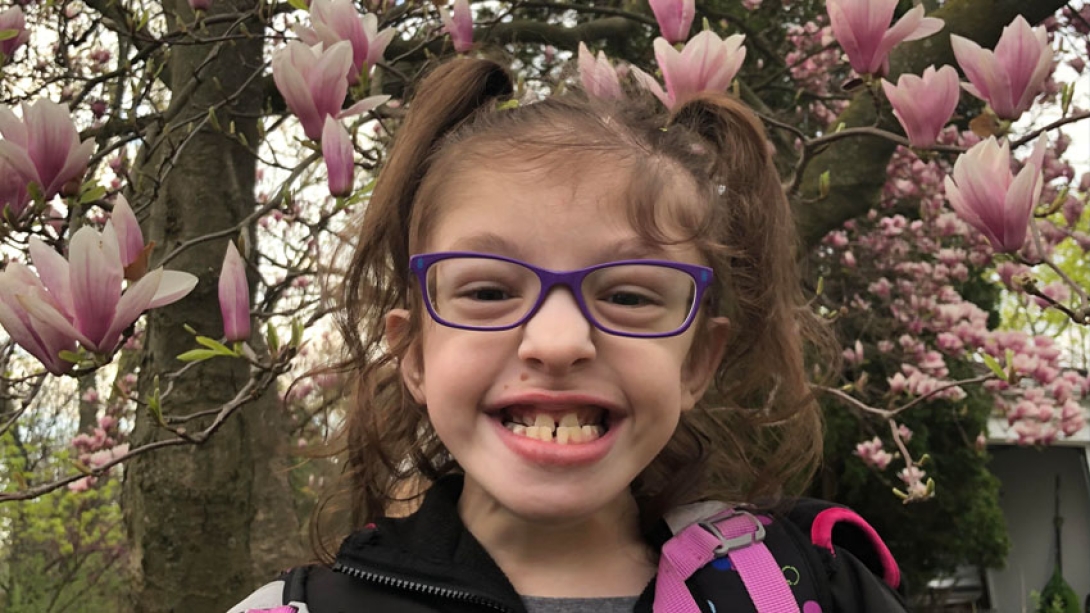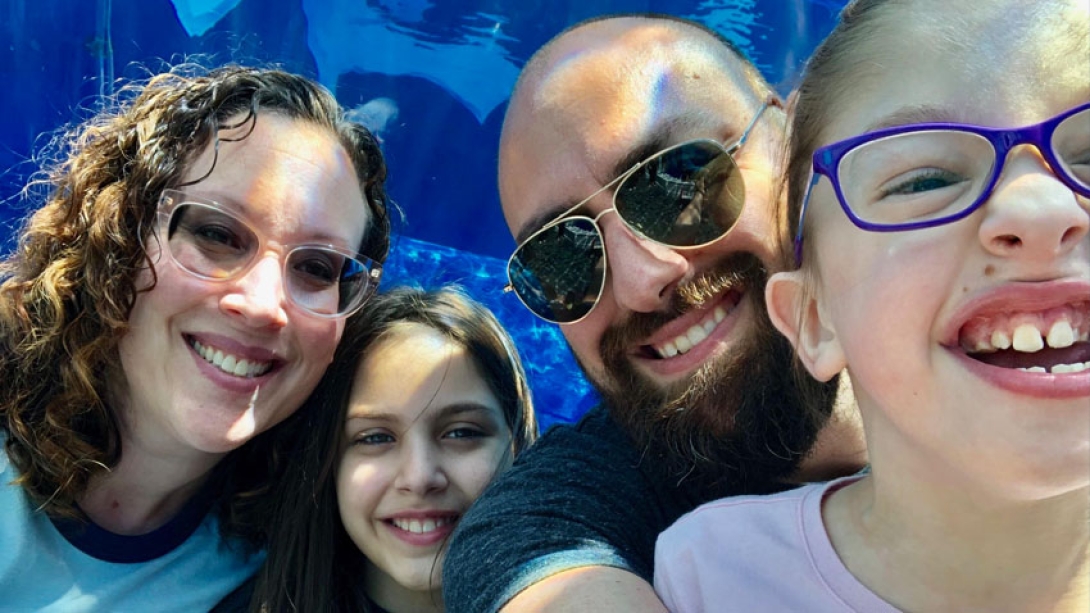A Detroit father offers advice for coping with uncertainty, balancing marriage and family, and making the most of small moments.
7:00 AM
Author |

For all fathers, the joys and chaos of parenthood are many.
But for men who have a child or children with special needs, the added challenges can be overwhelming — and ones that caretakers of typical kids might never fathom or encounter.
LISTEN UP: Add the new Michigan Medicine News Break to your Alexa-enabled device, or subscribe to our daily audio updates on iTunes, Google Play and Stitcher.
As a result, "it can be really hard for these dads to talk about the emotional stuff," says Benji Rosenzweig, a father of two from West Bloomfield, Michigan.
His second and youngest daughter, Ellah, was born with a number of health conditions. Her main diagnosis is Coffin-Siris syndrome, or CSS, a rare genetic mutation believed to affect about 300 people globally. CSS causes a number of developmental and structural defects.
Ellah's related complications include agenesis of the corpus callosum (ACC), a congenital defect that involves a lack of development in the main bridge of nerves connecting the right and left sides of the brain.
She also has cavernous transformation of the portal vein, in which a Y-shaped vein intended to deliver blood to the liver instead "looks like some jumbled-up phone cords," her father says.
Additionally, Ellah has cyclic vomiting syndrome, which puts the 8-year-old in the hospital — including University of Michigan C.S. Mott Children's Hospital — several times each year.
MORE FROM MICHIGAN: Sign up for our weekly newsletter
Despite those challenges, Rosenzweig wants to be transparent about his family's journey.
He's active in a number of advocacy and research organizations. He blogs about his experience for Friendship Circle, a Michigan nonprofit that offers a variety of recreational and vocational opportunities for people with special needs, and serves as a resource for other families of children born with ACC.

The family also takes advantage of Partners for Children, a community-based pediatric palliative care service for children with complex medical care needs and conditions.
Rosenzweig's main advice for dads in similar circumstances? Don't struggle in silence.
"None of us were born with the information that we need in order to navigate this territory," he says.
Advice for dads of special needs children
1. It's OK to feel vulnerable
With their parenting roles historically seen as providers and protectors, fathers might hesitate to express feelings of stress or fear.
"Dads are basically somewhat shaven monkeys," jokes Rosenzweig. "We're expected to be strong and constantly be there."
SEE ALSO: How Dads Can Cope When a Child is Sick
That's why the 37-year-old follows this mantra: I'm here and I don't have the solution but I'll help figure it out.
2. Have a support system
Rosenzweig's wife, Sarah, is active in several special needs and condition-specific groups for moms — a seemingly natural fit for many women.
But connections are crucial for men, too.
Whether it's an online forum, Facebook group or in an in-person social function, swapping information and encouragement with other dads of special needs kids, "community is a crucial element," says Rosenzweig.
3. Find strength in your spouse
Sharing household duties is key for any couple. Those tending to additional medical or emotional challenges face different and sometimes seemingly greater hurdles.
"When we got married, we said: 'It's you and me against the world,'" Rosenzweig says. "That didn't change when we had children."
The couple divvies up Ellah's medical appointments (going together when necessary) and takes turns giving each other a respite to sleep late.

4. Always be an advocate
Special needs children may not be able to speak for themselves, making a parent's voice a vital component.
SEE ALSO: Parents' Top 10 Children's Health Concerns (and How to Handle Them)
Says Rosenzweig: "I have a good relationship with my daughter's teachers and medical team, but if something's not right I will speak up."
A recent intervention helped Ellah receive a "life-changing" port implant in order to avoid continual IV pokes that were not only traumatic but damaging to her fragile veins.
5. Quality time is key
The activity itself isn't most important; interaction is what counts.
Ellah loves music videos, so "we sing and dance along," says Rosenzweig, who notes that his daughter "tends to get onto two or three songs and those are the only songs that exist in her world — sometimes that's a Grateful Dead song, sometimes it's Sesame Street."
An animal lover, Ellah also enjoys watching nature videos — which has inspired the family to visit their local zoo often.
I have a good relationship with my daughter's teachers and medical team, but if something's not right I will speak up.Benji Rosenzweig
6. Inform (and shelter) other siblings
A balanced approach guides Rosenzweig's parenting of his other daughter, 9-year-old Na'amah. Part of it is teaching her to be an advocate and involved in a long-term care plan.
"But that's a lot of responsibility for a child," Rosenzweig says. "It's also about giving Na'amah her own time, space and stuff so that she's not just known as Ellah's older sister. She needs to be her own person."
This year, she began attending a Sib4Sib group in Farmington Hills, Michigan, which connects siblings of children with mental and other health or cognitive diagnoses in facilitated groups. It's been a huge asset in her coping arsenal, her father says.
7. Support teachable moments
Having a child who may fuss or need medical assistance in public spaces could elicit criticism from strangers.
Even well-meaning remarks can sting — but Rosenzweig works to keep his composure.
SEE ALSO: Preparing for Puberty in Girls with Disabilities
"If that interaction ends in an uncomfortable or negative manner, the likelihood of that person trying better next time is low," he says. "It's about teachable moments and training others for the next interaction with someone who is different than them."
8. Plan for the future
Although the thought may be uncomfortable, parents should seek help with finances and paperwork to help ensure a special needs child is set up to receive proper benefits and protections in their later years.
"Tax laws are really complicated," Rosenzweig says. "Everybody's situation is different, but at the end of the day you're not going to live forever.
"The long-term financial health of your family is also important. Ask for help from a professional."

Explore a variety of healthcare news & stories by visiting the Health Lab home page for more articles.

Department of Communication at Michigan Medicine
Want top health & research news weekly? Sign up for Health Lab’s newsletters today!





